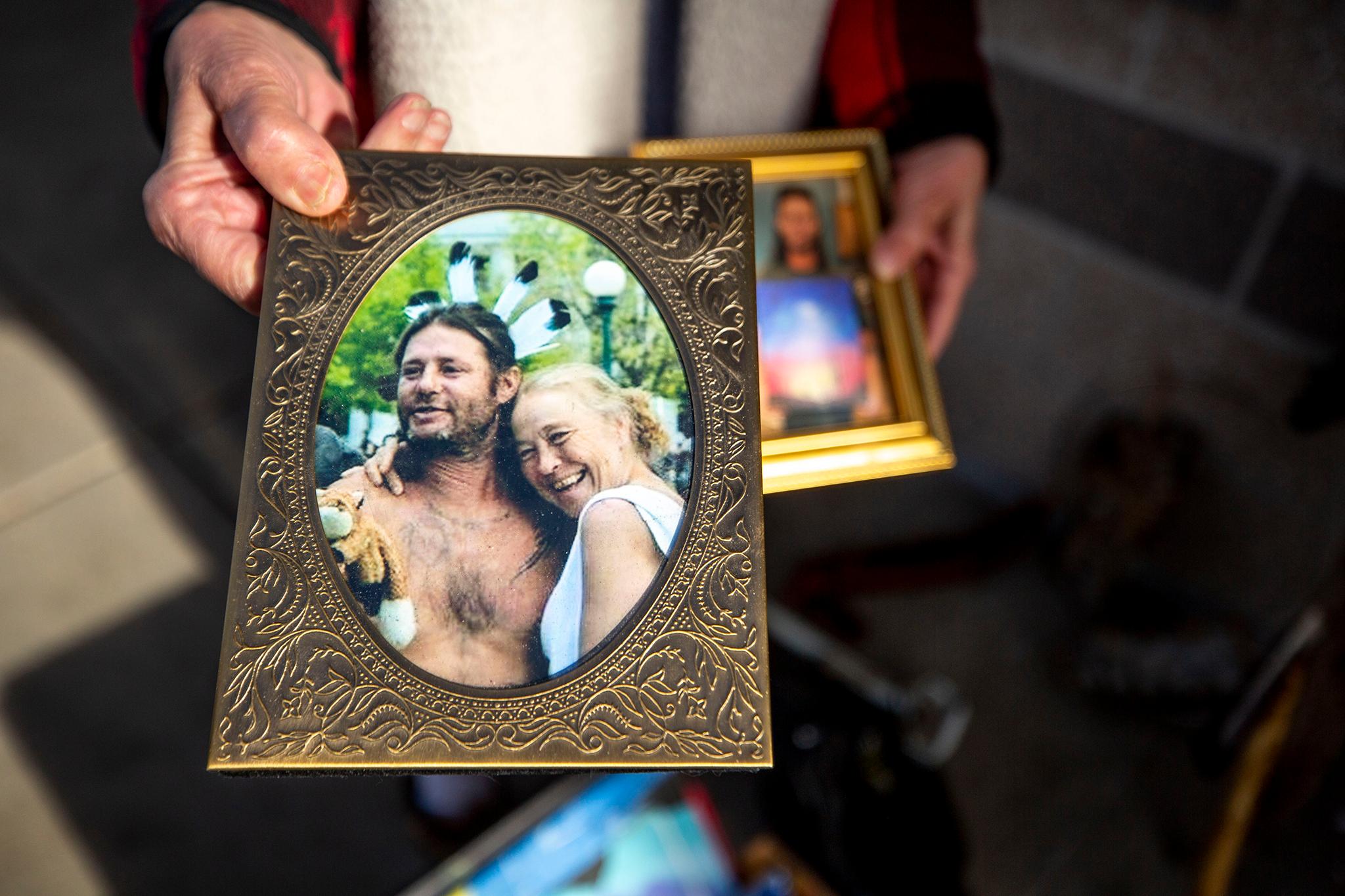On what would have been her late partner's 49th birthday, Stacy Neill headed to a stretch of the Cherry Creek Trail where she used to help him collect fallen branches. He would transform them into walking sticks embellished with feathers, beads, strips of leather and scorch marks.
Neill sat on a bench where she and Todd Ham would have rested and used her phone to play some of his favorite music. Ham, who was known as "Apache," loved Metallica, Guns N' Roses and Mötley Crüe, Neill said, laughing. She's more of an Elvis fan.
"I got him into Elvis," she said.

Her private heavy-metal memorial was on Nov. 21. On Monday, Ham's name was among those of more than 220 people remembered during a vigil for people who experienced homelessness who died in 2020. The vigil is organized by the Colorado Coalition for the Homeless every year on the longest night of the year, and in Denver often among the the coldest nights (the timing is meant to bring home the difficult conditions people living on the streets endure). The Colorado Coalition for the Homeless works with social service agencies in the Denver metro area to make an accounting of the dead. Then the names are read aloud at the City and County Building memorial.
"Every person I encounter is a beautiful human and I really believe that we need to respect them," said Elisabeth Francis, a clinical outreach worker at the homelessness service provider Saint Francis Center. "I don't want anyone to be forgotten."
Ham, who was born in Del Norte, Colorado, in 1971, died June 11 at The Denver Hospice Inpatient Care Center in Lowry. Neill said that even though Ham had been living at the Saint Francis Apartments at Cathedral Square when he died, it was fitting that he was among those remembered on Monday because he was close to so many people who don't have housing.
"I hate to see them out there," Neill said. "We were out there. He was out there for 15 years. I was out there for five."
The Saint Francis Apartments in Capitol Hill is a project of the Saint Francis Center and Saint John's, Denver's Episcopal Cathedral. The high-rise off Colfax Avenue has 49 units and offers support for people who have recently experienced homelessness. After Ham moved in the year the project opened in 2018, he and Neill, who had her own income-restricted apartment in Whittier, could often be found during the day on the streets where they had once lived.
"We would sit, and he would paint and draw," Neill said.
Joe Lugue was a missionary with the Catholic Christ in the City program when he met Ham in late 2016. Ham was known for rarely wearing shoes or shirts in the summer.
"He was kind of that contradiction of a carefree guy ... and this artist who was very much strict on himself," said Lugue. "He had a vision that he wanted to to express in his work. Sometimes he fell short."
Ham would sometimes destroy work he had made.
A year after they met, Ham invited Lugue to a gallery. A curator had seen Ham's paintings on the street and invited him to be part of a group show.
"It was very different to be in a gallery with him. I was dressed up," Lugue said. "And he was dressed up. Definitely a shirt and pants, shoes."
Ham sold two paintings at the gallery show, Neill said. She said he often explored Native American themes in his artwork, including a boldly colored depiction of a dreamcatcher that she owns.
"His paintings just are what they are because that's who he was,' Neill said. She said he took a DNA test that showed he had Apache ancestry.
The Metro Denver Homeless Initiative recently released a report highlighting the disproportionate impact that homelessness has on minorities. Native Americans make up fewer than 1 percent of the region's population but 5.6 percent of people experiencing homelessness, according to the latest annual Point in Time, a survey conducted by the Metro Denver Homeless Initiative.


Neill said Ham loved dogs and cats but didn't want a pet when he was living on the streets because he did not feel he could care for one. After he moved into his apartment, he took home a stray cat that had crept into Neill's apartment building during a snow storm. The cat, named Moon, now lives with Neill.
"He had so much to live for," Neill said. "Unfortunately, his health just took a turn for the worse."
Kathy Carfrae, director of housing at the Saint Francis Apartments, said Ham would let her know when he felt that someone struggling with alcohol, a challenge he also faced, was in crisis.
"We were fortunate to have Apache here. We were," Carfrae said. "He saw himself as a protector. He was a champion of the underdog. He really identified with the underdog and the folks outside."
Coming inside helped him reconnect with family members, Carfrae said. His mother, who lives in Illinois, would call him and call Saint Francis staff to check on him. His survivors include his mother, his son and two grandsons. His daughter died a few years ago.
Francis said Ham would sometimes call her from his apartment and pass the phone to people who were visiting him, some of whom were experiencing homelessness.
"He just drew people in who wanted to know him," she said. "He really cared about anyone he encountered. He just poured so much love into every relationship."













